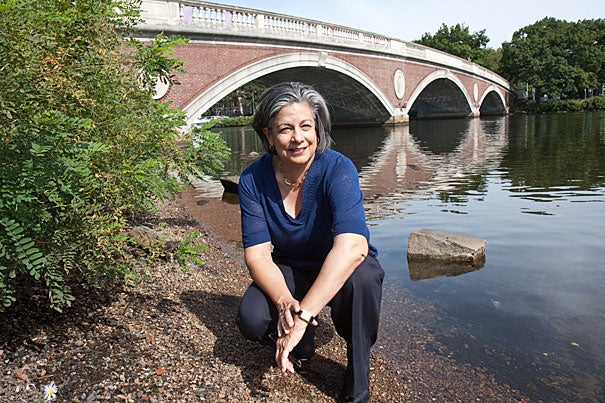
Water utility expert Susan Leal helped transform San Francisco’s unsafe water system. Now a senior fellow at the Advanced Leadership Initiative, Leal has co-authored a book on saving the world’s water resources with Peter Rogers, Gordon McKay Professor of Environmental Engineering in Harvard’s School of Engineering and Applied Sciences.
Jon Chase/Harvard Staff Photographer
Spouting off
Book offers solutions to a global predicament
If you ever wondered why your mother poured Sunday morning’s bacon grease into an empty can, it’s because mother really knew best: She was trying to prevent a human-made disaster in the sewers.
Each year, millions of gallons of grease clog sewers, causing them to overflow and setting off a costly environmental and public health fiasco. But, to Susan Leal and Peter Rogers, grease is just one of many urgent issues facing water resources in the world today.
“There is no life without water — biological systems do not function without it,” said Rogers, Gordon McKay Professor of Environmental Engineering in Harvard’s School of Engineering and Applied Sciences.
“Currently, there is much more attention given to energy and oil as important resources. But, while there are substitutes for oil and energy — with wind, solar, and biofuels — there is no substitute for water. It is essential for everything from the food we eat to basic hygiene,” said Leal, a water utility expert and a senior research fellow at Harvard’s Advanced Leadership Initiative.
In their new book, “Running Out of Water: The Looming Crisis and Solutions to Conserve Our Most Precious Resource,” Rogers and Leal discuss water’s global predicament as the world’s population soars to 8 billion, and present some simple ways to preserve and conserve, which include pushing lawmakers to make water a priority. Political will begins with the public, Rogers and Leal say.
Leal, who had been encouraged to write a book about water as part of her fellowship, “quickly dispensed of the idea as being too ‘academic,’ ” she said. Then she met Rogers, “who was grappling with how to write a book on water geared toward a general readership audience. We agreed to write the book together with a focus on solutions to our water crisis. We eschewed the doom and gloom and decided to describe and promote the water success stories.”
The result, said Rogers, was “perfect serendipity.”
“In our book we give examples of the intelligent use of existing technologies, which if applied could greatly reduce the crisis to manageable proportions without necessarily requiring major sacrifices on anybody’s part,” he said.
“One solution for averting the impending water crisis is water reuse,” Rogers continued. “Treating sewer water and using it for irrigation and, in some cases, as potable water. In several locales throughout the world, water reuse has been successfully implemented and accepted by consumers.”
“We also describe solutions applicable to large agricultural users and involve the application of innovative technologies such as center pivots and drip irrigation, as well as new drought-resistant and high-yielding crop varieties to achieve better crop yield with less water use,” said Leal. “The book is filled with solutions that can and should be replicated.”
Another conundrum is the widespread acceptance of bottled water, which has eroded the public’s faith in tap water. Not to mention, most bottles are never recycled.
“Consumers should avoid the silly spending on bottled water. And, water utilities need to educate their customers about the quality of tap water and inform them that it has to meet a higher federal standard than bottled water,” said Rogers.
Said Leal: “States should require that bottled water be labeled to disclose the source of the water. In many cases, the source of bottled water is municipal tap water.”
Take that, Evian.




